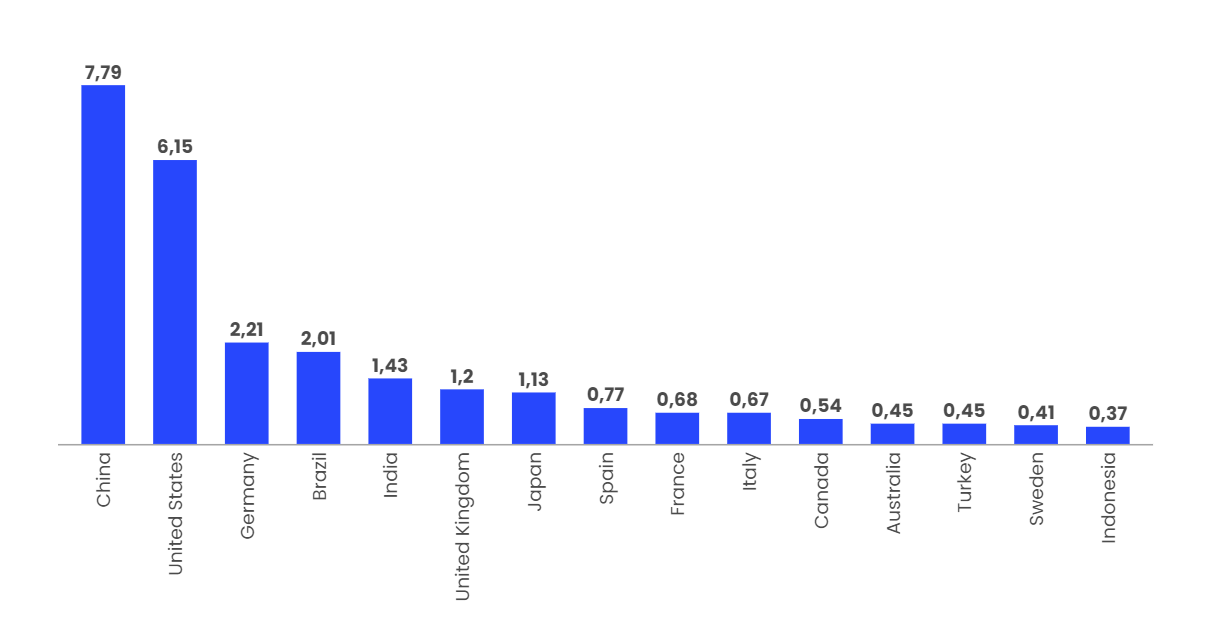CleanTech Trends

Climate change is a fact and all companies have a responsibility to contribute to slowing down this change. The specific weight of organisations in the world is decisive for the movement against climate change to be effective. It is estimated that, by 2050, more than 75% of the energy produced on the planet will be renewable.
Currently, the energy consumed globally by region is as follows:
Renewable energy consumed globally, by region (in ExaJoules energy units)

CleanTech refers to companies that have incorporated clean technologies into their production chains in order to have a positive environmental impact. This is a rapidly growing movement in recent times. More and more technologies and companies are looking to use clean technologies to address problems related to the climate emergency. CleanTech is an industry of the future where disruptive companies are relying on sensors for renewable energy monitoring, predictive weather modelling or carbon capture technology, among others.
To understand what the term CleanTech really means, it is necessary to define what clean technologies are. These encompass technologies and innovations that have the potential to generate measurable positive environmental impacts such as the reduction of greenhouse gas emissions, the conservation of natural resources and water, recycling and reuse.
Clean technologies are increasingly integrated into everyday life such as LED storage and lighting, wind and solar energy. CleanTech also includes new ways of synthesising animal protein, advanced materials, fermentation processes to convert carbon into fuel and renewable chemicals, green steel and cements, and so on.
In addition to the aforementioned technologies, there are new energy distribution and storage technologies such as microgrids, which are distributed electricity grids made up of small energy sources that operate autonomously from the main grid. This type of technology needs to make use of IoT devices and artificial intelligence to function correctly and automatically. They can also be joined by technologies such as carbon-neutral power generation and diffusion energy, which will have wide application in transport, infrastructure and water.
Sustainable energy and energy optimisation systems themselves are the first companies to use sustainable energy sources to reduce dependence on carbon fuels: these include wind energy, hydropower, solar energy, geothermal energy and smart energy. The latter refers to the optimisation of energy demand through connected energy consumption, automated distribution and responsive energy supply.
On the other hand, there are technologies dedicated to reducing pollution and controlling global pollutant emissions by adopting renewable energies and pursuing a transition to biofuel and electric vehicles. Also, there are technologies that provide clean water for water and wastewater treatment to reduce water consumption. Recycling and waste management technologies focus on minimising pollution and carbon footprint in the processing of electronic materials and devices.
Achieving zero pollution agreements in Europe could happen because around 40% of the necessary emission reductions could come from technologies that are still in R&D or demonstrated, but not yet mature. The remaining 60% could be achieved through the widespread deployment of mature and proven technologies.
Future outlook for CleanTech
Any technology industry needs clean technology innovation to further develop and improve sustainability to meet emission reduction targets, bringing with it a symbiotic relationship between business and government that benefits all.
It will be essential for different parts of society to get involved for the CleanTech idea to be realised. CleanTech experts must generate solutions and provide expertise throughout the innovation cycle. More traditional industries such as oil and gas must invest to test and adopt new technologies, investors must commit funds to the development of these new technologies, educational institutions must contribute to the innovation and development of these technologies in laboratory settings and, finally, governments play a key role in attracting investment, developing the export market and establishing regulatory frameworks.
The main clean technology trends expected in the coming year are renewable energies. Renewable energy sources such as solar, wind, geothermal and wave energy are the most popular alternatives. Several industries are using renewable fuels to make their operations cleaner and more sustainable.
Another trend will be low-carbon construction, whose sector is transitioning towards more sustainable practices. Low-carbon construction takes care of making the building process less damaging and more in sync with living nature by introducing elements such as plant walls or exteriors that facilitate cooling, bamboo flooring, green insulation, and so on.
Carbon capture, use and storage (CCUS) is the process of capturing carbon emissions, to store or recycle the captured carbon. These techniques ensure the removal of industrial carbon dioxide. Innovations in this area include artificial photosynthesis using biosolar leaves and phytoplankton-based solutions that mimic the chemical process of photosynthesis.
Electric cars, green materials, energy consumption management or circular waste management add to these trends that will continue to be highlighted in the coming years for the CleanTech field.
Some of the leading CleanTech startups that can help companies to use cleaner technologies are:
- Alter5: has established itself as the institutional marketplace for clean energy investments. It is an open architecture platform that accelerates the global energy transition by connecting capital providers with renewable energy projects in a 100% digital environment. They collaborate with financial institutions and entities to create financial products that make these investments more accessible with the aim of moving towards a more sustainable economy. Through its operations, Alter5 accelerates the transformation of the European economy and supports the growth of sustainable businesses by providing them with the capital they need. Alter5’s model encompasses two elements, a digital platform that facilitates the origination, validation and presentation to investors of sustainable alternative assets and a green bond issuance vehicle incorporated in Luxembourg that allows investors to standardise investment operations and use a single set of documentation for all investments made through the platform.
- Starke energy: working towards cleaner, cheaper and more flexible energy systems through local integration. Starke energy invests in local storage networks to ensure that energy is available whenever it is needed. Energy systems can be much cleaner, cheaper and more flexible to operate if they are integrated locally. Connecting building owners, their tenants, grid operators and energy suppliers can create added value for all.
- Bechained: is one of the newest CleanTech startups. Bechained builds the largest demand-side capacity network to help balance the grid, reduce CO2 emissions and create CO2 credits from sustainable innovation. It offers its customers a renewable energy marketplace to balance and manage the relationship between supply and demand, through the use of artificial intelligence. Through the development and subsequent use of its solution, the company manages to have a positive impact on climate change.
- FlexiDAO: FlexiDAO’s software helps companies achieve net zero emissions by tracking where their electricity comes from and their actual CO2, every hour of every day. The company offers companies in the energy sector specialised software, based on data analytics, with which to achieve their green energy goals. They use Blockchain to match energy production data and energy consumption data every hour of the day, linked to official energy certificates, giving them a control room to monitor their renewable energy portfolio, certificates and emissions in one place.
Conclusions
CleanTech encompasses those technologies and innovations that have the potential to generate positive environmental impacts. These positive impacts include reductions in greenhouse gas emissions, conservation of water and natural resources, waste prevention through recycling and reuse, among others.
All industries will be undergoing a dramatic transformation as the world moves towards a low-carbon and environmentally sustainable economy. Forward-thinking companies are already moving quickly to embrace this major trend and gain competitive advantage through clean technology innovations.
The areas on which CleanTech startups are focusing are diverse, ranging from biogas and hydrogen and energy efficiency to the circular economy, sustainable mobility and smarts cities. Here are some of the most revolutionary projects in the field of clean energy.


